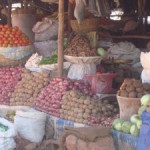IFPRI’s Poverty, Health and Nutrition Division (PHND) – New Delhi aims to hire 2 Research Analysts (RA) to work on multiple projects related to nutrition, health, and gender! If that wasn’t enough to grab the attention of budding researchers, here’s why a position with IFPRI- PHND is a great opportunity for you: The PHND team >> Read more Source: POSHAN: Partnerships and Opportunities to Strengthen and Harmonize Actions for Nutrition in India
IFPRI Ghana 2019-04-09 09:58:16
by Maxwell Young Ghana’s steady economic growth since the 1980s has helped reduce poverty and improve food security and is considered one of the development success stories of Africa south of the Sahara. Ghana’s agricultural transformation—improvements in farming technology, value chains, crop diversity, and other changes—has been key to that growth. Less clear, however, is […] Source: IFPRI Ghana
Understanding urban consumers’ food choice behavior in Ethiopia: Promoting demand for healthy foods
ESSP Working Paper 131, by Mequanint B. Melesse, Marrit van den Berg, Alan de Brauw, and Gashaw Tadesse Abate. Abstract: Using survey data collected from 996 representative households in Addis Ababa, Ethiopia, this paper documents several insights to help understand urban consumer food purchasing and consumption choices. The findings can be summarized as follows: 1) We find >> Read more Source: Ethiopia Strategy Support Program
Publication: Beyond the business case for agricultural value chain development: An economywide approach applied to Egypt
Clemens Breisinger, Mariam Raouf, James Thurlow, Manfred Wiebelt
This paper goes beyond the “business” case for agricultural value chain development and presents an economy-wide framework to make the “development” case. We show that there are several key transmission channels that determine the economy-wide impacts of promoting various value chains, including forward and backward economic linkages, price responses, and net employment effects. Source: IFPRI Egypt Country Office
Who gains from an increasingly industrialized food system?
Rob Vos, IFPRI
Food supply systems have changed dramatically over the past half century, with enormous advancements in distribution systems, processing technologies, and delivery of services. As systems once based entirely on agriculture become steadily more industrialized, diets have changed. People are eating more and more processed foods and are more likely to use food services outside of their homes. This is increasingly the case in developing countries. These trends are responses to changing food demand and also drivers of that demand, including the rise of a global middle class and rapid urbanization. Source: IFPRI Egypt Country Office
- « Previous Page
- 1
- …
- 44
- 45
- 46
- 47
- 48
- …
- 55
- Next Page »

